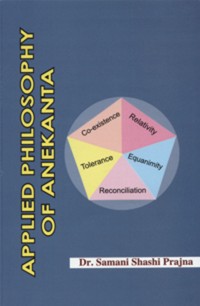Jainism holds that the followers of other sects can also achieve emancipation, if they are able to destroy attachment and aversion. The gateway of salvation is open to all. Jains do not believe in narrow outlook that, "Only the follower of Jainism can achieve emancipation, others will not." Moreover it is said in the Sūtrakṛ āṅga (2nd cent. B.C.), the second earliest Jain work, that those who praise their own faith and views and discard those of their opponents, possess malice against them. Hence they remain confined to the cycle of birth and death.[1] In another famous Jain work of the same period, the Isibhāsiyaṁ, the teaching of the forty-five renounced saints of Śramanic and Brahmanic schools of thought such as Nārada, Bhāradvāja, Mankhali-Gośāla and many others have been presented with due regards.[2] They are remembered as arhatṛṣi and their teachings are regarded as āgama. In Uttarādhyayana Sūtra also there is a reference to anyaliṅga-siddhās i.e. the emancipated souls of others sects. In the history of world religions, there is hardly any example in which the teachings of the religious teachers of the opponents sects were included in one’s own scriptures with due esteem and honour. The verse highlighting the broad-outlook of Hemacandra (12th cent. A.D.) the celebrated pontiff of jain philosophy is really touching. He says
bhava bījāńkurajananā rāgādyakşaya mupāgata-yasya,
brahmā vā viṣṇurvā haro vā jino-va namastasmaiḥ[3].
Jains believe that the only way to attain liberation is destruction of attachment and aversion. On the one hand, in whom these two emotions have been totally wiped away, be He Brahma, Vishnu, Shiva or Jina, I salute all of them. Finally, we can say that from among all non-absolutist ācārya-s, Haribhadra was the most broad-minded. His tolerant attitude to the ācārya-s of other sects won him plaudits. For he never showed any partisanship and parochialism and considered them as seekers of truth. Though the time he lived in, was marked by individualistic attitude in respect of particular sects. Haribhadra, instead of being individualistic regarding the Jain philosophy, sought a synthesis-specific approach. And, needless to state, this approach is evidence enough of his broadmindedness in those troublesome times. Haribhadra, a staunch advocate of religious tolerance remarks, "One, who maintains equanimity of mind will certainly get emancipation, whether he may be a śvetāmbara or digambara or Buddhist or anyone else. Along with this he says,
pakṣapāto na me vire na dveṣah kapiladiṣu,
yuktimadvacanaṁ yasya tasya kāryaḥ parigraḥ[4].
I have no bias towards Lord Mahāvīra and no disregard to Kapila and other saints and thinkers. Whosoever is rational and logical ought to be accepted. It is this broad outlook of the Jains, which makes them tolerant to the alien thoughts and thereby establish the peace and harmony.
 Dr. Samani Shashi Pragya
Dr. Samani Shashi Pragya

